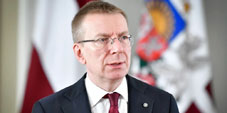
Latvian President Criticizes Georgian Government for Straying from NATO and EU Path
By Liza Mchedlidze
Monday, July 22, 2024
Latvian President Edgars Rinkevics has expressed strong criticism of the Georgian government, stating that it has strayed too far from its path toward NATO and EU membership. In an interview with the Georgian editorial office of Voice of America, Rinkevics addressed the lack of a clear promise for Georgia's NATO membership in the recent Washington summit declaration, which contrasts with previous years.
Rinkevics remarked that Georgia appears to have decided it can proceed without NATO and EU membership. He specifically cited the controversial "Foreign Agents" law and the government's dismissal of calls from its own society, the European Union, and NATO as evidence of this shift.
"This means that the government of Georgia has gone too far," Rinkevics stated. "Formally, Georgia is a candidate country, but we should limit this status unless it decides to uphold the common values we all share. If not, you are not part of this club. This is your sovereign decision."
Rinkevics emphasized that NATO membership is based on strict criteria, including democracy, rule of law, respect for human rights, and civilian control of the military. He stressed that if a country does not meet these criteria, it is the sovereign choice of NATO and EU member states to halt the membership process.
He urged Georgia to reconsider some of its legislation, warning that failure to do so would impact discussions about its membership. He noted that membership criteria must be fulfilled by candidate countries, and deviations from these values will not be tolerated by NATO and the EU.
"This is really Georgia's choice. The Georgian people should decide what kind of country they want to build," Rinkevics said. He reaffirmed Latvia's position in NATO and the EU, stating that cooperation and aid programs could be reassessed if Georgia does not continue on the path of European and Euro-Atlantic integration.
Rinkevics concluded by saying, "We are ready to continue cooperation with Georgia and its support if Georgia is ready to protect the values that we all share," leaving it to the Georgian government to address the security consequences of their decisions.

